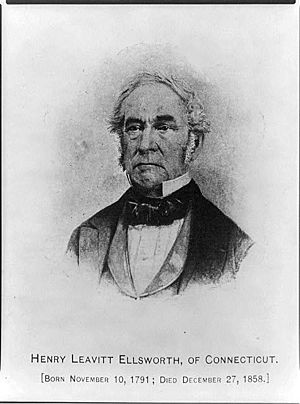Henry Leavitt Ellsworth facts for kids
Quick facts for kids
Henry Leavitt Ellsworth
|
|
|---|---|

Henry Leavitt Ellsworth, first Commissioner of the U.S. Patent Office, founder, United States Department of Agriculture
|
|
| Born | November 10, 1791. |
| Died | December 27, 1858 (aged 67) |
| Nationality | American |
| Occupation | Attorney |
| Known for | First Commissioner of the U.S. Patent Office |
| Political party | Free Soil Party |
Henry Leavitt Ellsworth (born November 10, 1791 – died December 27, 1858) was an American lawyer. He is best known as the first Commissioner of the U.S. Patent Office. He also helped start the United States Department of Agriculture. Ellsworth supported inventors like Samuel F.B. Morse (who invented the telegraph) and Samuel Colt (who invented the revolver). He was also the second president of the Aetna Insurance Company.
Contents
Early Life and Education
Henry Leavitt Ellsworth was born in Windsor, Connecticut. His father was Oliver Ellsworth, a Founding Father and a Chief Justice of the United States. Henry graduated from Yale University in 1810. He then studied law at Tapping Reeve's famous Litchfield Law School in 1811.
In 1813, he married Nancy Allen Goodrich. They had three children together. Later, he married two more times, to Marietta Mariana Bartlett and Catherine Smith. After finishing his law studies, Ellsworth lived and worked in Hartford for ten years.
Exploring the American West
First Journey West (1811)
When Henry Ellsworth was 19, he took his first trip west. He rode a horse to the Connecticut Western Reserve in what is now Ohio. His family owned a lot of land there, including most of modern-day Cleveland. Ellsworth wanted to check on these family lands.
He wrote a book about his trip called A Tour to New Connecticut in 1811. The journey was tough, but he met his old friend Margaret Dwight. She also wrote a book about her travels, A Journey to Ohio in 1810.
Commissioner to Native American Tribes (1832)
More than 20 years later, in 1832, Ellsworth traveled west again. This time, he was a U.S. Commissioner for Native American Tribes in Arkansas and Oklahoma. President Andrew Jackson chose him for this important role. Ellsworth's job was to "study the country, mark boundaries, and bring peace" among the tribes. This happened after Congress passed the Indian Removal Act in 1830.
Ellsworth visited Fort Gibson to understand the situation. Some people criticize him for his role in moving Native Americans to Indian Territory. However, other historians say he was sympathetic to the tribes.
On his journey, Ellsworth met famous explorer William Clark in St. Louis, Missouri. He also saw Black Hawk, a captured Native American leader. Ellsworth's mission was difficult. He had to help settle land disagreements between different tribes.
Ellsworth traveled with three companions:
- Washington Irving, a famous author who wrote A Tour on the Prairies about their trip.
- Charles La Trobe, an Englishman and travel writer.
- Count Albert Pourtales, a Swiss nobleman.
Leading the Patent Office
Becoming Commissioner (1835)
In 1835, Henry Ellsworth became the first Commissioner of the U.S. Patent Office. He held this job for ten years, until 1845. When he started, the office was a bit messy. He organized the many invention models and created the first list of patent applications.
Supporting New Inventions
Ellsworth made important decisions that helped inventors. He was very interested in Samuel Colt's new revolver. In 1836, Ellsworth approved Colt's patent, U.S. Patent No. 138. This decision helped Colt get money from investors to start his company, which became the famous Colt arms empire.
Ellsworth also saw the potential of Samuel Morse's telegraph. He asked Congress for money to test this new technology. His support helped the telegraph become a reality.
Father of the USDA
Ellsworth was very interested in farming and how new inventions could help it. He believed that steam-powered plows would one day farm the western lands. People thought this idea was crazy at the time, but he was right!
Because of his interest, Congress gave money for farming in 1839. This money was used to collect seeds from other countries and send them to farmers in the U.S. through the post office. By 1845, Ellsworth's patent office was doing the work of an agriculture department. For this, he is called the "Father of the United States Department of Agriculture."
Ellsworth once made a joke about how busy the patent office was. He said that human improvement might end because of all the new inventions. This comment was later twisted into a false story, an urban legend, that someone at the patent office claimed everything that could be invented already had been.
Later Life and Legacy
After leaving the Patent Office, Ellsworth moved to Lafayette, Indiana. He worked there helping people buy and settle public land. He also served as a presidential elector for the Free Soil Party in the 1848 election. Later, he became an early president of the Aetna Insurance Company.
Ellsworth was a generous supporter of Yale College, his old school. He gave them a lot of money and land. He died in Fair Haven, Connecticut, on December 27, 1858, at age 67.
His daughter, Annie Goodrich Ellsworth, played a special role in history. She dictated the very first message sent on Samuel F. B. Morse's new telegraph system. The message, suggested by her mother, was: "What hath God wrought."
See also
- Patent Office 1877 fire
- Patent Office 1836 fire
Images for kids
-
Oliver Ellsworth Homestead, Windsor, Connecticut, birthplace of Henry Leavitt Ellsworth, National Historic Landmark
-
Text of the first telegraph message sent by Samuel F. B. Morse. Presented to Miss Annie G. Ellsworth, daughter of Henry Leavitt Ellsworth. Annie's ink tracing over Morse's pencilled letters. Gift to Library of Congress by Mrs. George Inness, daughter of Annie Ellsworth
 | Valerie Thomas |
 | Frederick McKinley Jones |
 | George Edward Alcorn Jr. |
 | Thomas Mensah |



